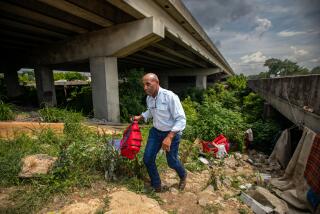‘Invisible Poor’ Struggle in Suburbs’ Affluence : Poverty: Some wealthy communities hide pockets of despair. In Massachusetts, a stagnant economy and the high cost of living are blamed.
- Share via
WELLESLEY, Mass. — Summertime is tough for Jeanne Brissette, who longs to give her kids the back-yard barbecues and baseball outings she knew while growing up in an affluent suburb.
Today, the divorced mother of four is scraping by on $100 a week. Making sure her children have new sneakers means months of scrimping.
“I figured I’d have everything my mother had, the nice home and all that,” Brissette, 42, said recently. “But I’m robbing Peter to pay Paul and still barely getting by. How can I hope to get ahead?”
She is part of a suburban secret, 9.5 million poor people scattered among the nation’s manicured lawns and back-yard basketball hoops.
“They are the invisible poor,” said Sheldon Danziger, a University of Michigan poverty researcher. “They are seldom discussed.”
These people live on the edge of bankruptcy, foreclosure and life on the streets. Many have already been pushed off the precipice by New England’s broken-down economy and inflationary cost of living.
Like Brissette, fellow Wellesley resident Frank G., who spoke on condition that his family’s name not be used, measures his life in checks: paychecks, unemployment checks, checks from relatives lending a hand.
Jobs are scarce, so the 31-year-old construction worker and his wife are rearing three children on about $600 a month in a town where the median home price is about $340,000.
“I’m two paychecks away from getting thrown out on the streets,” he said. “I was treated better in the inner city. At least there you were on the same wavelength.”
His family and Brissette and her children live in Barton Road, a faded housing project for financially strapped families.
Frank’s wife has to walk two hours round trip, with children in tow, to a supermarket because they have no car and there is no public transportation.
Residents of wealthy communities are beginning to face pockets of despair camouflaged by country clubs and, in Wellesley’s case, a prestigious women’s college.
Since 1986, suburban welfare cases have jumped 12%, compared with a 5% increase in the number of urban poor. Officials estimate the state has 44,000 suburban welfare cases, just 4,000 fewer than in the cities.
More than 28% of the 520,000 people living below the poverty line in Massachusetts now reside in suburbia, where about 80 food pantries have sprung up to feed them.
“The poverty has been masked for a long time,” said Westy Egmont, executive director of the Boston Food Bank. “But social-service providers are documenting the reality.”
Frank found himself homeless after leaving the Navy in 1980. “We’ve been dirt poor, but we’re a family . . . and that’s what it’s all about,” he said.
Frank’s family moved to Wellesley from Boston five years ago when their number was called for the low-cost housing project. But the cost hasn’t turned out to be that low.
Each time Frank gets a decent job, the rent is adjusted upward. It has climbed as high as $700.
Jobs have been hard to come by, and welfare is not for Frank, who is built like a football player and more than ready to work. He never gives up, but being broke gets him down.
“It’s tough when friends say: ‘Let’s go to see the Bruins play’ and your priority is in diapers,” Frank said.
Living on the edge takes its toll on everyone. But it’s perhaps hardest for the children, whose schoolmates are dressed in the best and riding brand new 10-speed bikes.
“Sometimes they say mean things like, ‘Your mother’s on welfare,’ ” said Frank’s 10-year-old daughter, Janelle.
Brissette, with two young sons still at home, had a stormy marriage that ended in a divorce seven years ago.
When the money runs out, she joins the line of people seeking help from the local food bank. Things aren’t at all the way she planned.
“It’s a story of incredible pain because of the contrast between being poor and living in Wellesley,” Egmont said. “We can’t escape the fact that we are all marginal.”
More to Read
Sign up for Essential California
The most important California stories and recommendations in your inbox every morning.
You may occasionally receive promotional content from the Los Angeles Times.













